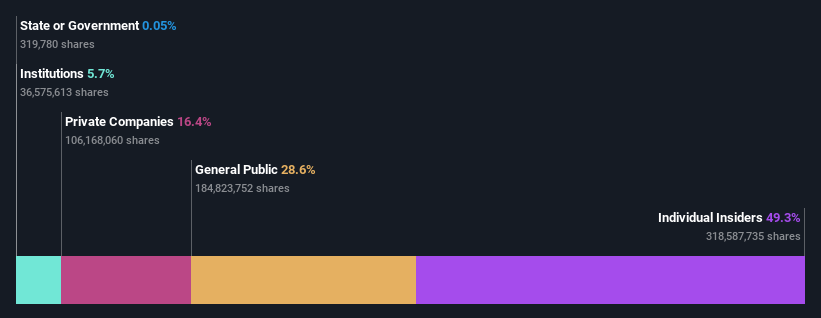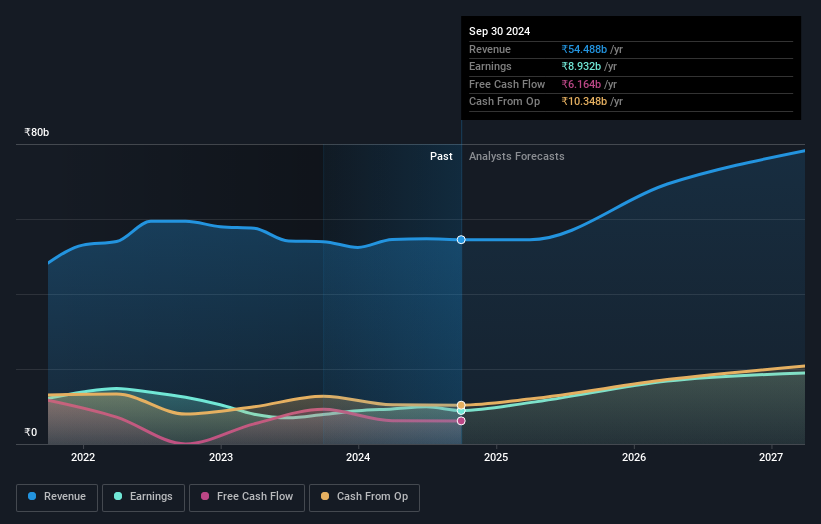- India
- /
- Metals and Mining
- /
- NSEI:GPIL
Godawari Power & Ispat Limited (NSE:GPIL) CEO Bajrang Agrawal's holdings dropped 8.1% in value as a result of the recent pullback

Key Insights
- Insiders appear to have a vested interest in Godawari Power & Ispat's growth, as seen by their sizeable ownership
- 53% of the business is held by the top 11 shareholders
- Past performance of a company along with ownership data serve to give a strong idea about prospects for a business
A look at the shareholders of Godawari Power & Ispat Limited (NSE:GPIL) can tell us which group is most powerful. We can see that individual insiders own the lion's share in the company with 49% ownership. Put another way, the group faces the maximum upside potential (or downside risk).
As market cap fell to ₹137b last week, insiders would have faced the highest losses than any other shareholder groups of the company.
Let's take a closer look to see what the different types of shareholders can tell us about Godawari Power & Ispat.
View our latest analysis for Godawari Power & Ispat

What Does The Institutional Ownership Tell Us About Godawari Power & Ispat?
Institutional investors commonly compare their own returns to the returns of a commonly followed index. So they generally do consider buying larger companies that are included in the relevant benchmark index.
Godawari Power & Ispat already has institutions on the share registry. Indeed, they own a respectable stake in the company. This suggests some credibility amongst professional investors. But we can't rely on that fact alone since institutions make bad investments sometimes, just like everyone does. When multiple institutions own a stock, there's always a risk that they are in a 'crowded trade'. When such a trade goes wrong, multiple parties may compete to sell stock fast. This risk is higher in a company without a history of growth. You can see Godawari Power & Ispat's historic earnings and revenue below, but keep in mind there's always more to the story.

Hedge funds don't have many shares in Godawari Power & Ispat. With a 8.8% stake, CEO Bajrang Agrawal is the largest shareholder. In comparison, the second and third largest shareholders hold about 8.2% and 5.9% of the stock. Interestingly, the second-largest shareholder, Dinesh Agrawal is also Senior Key Executive, again, pointing towards strong insider ownership amongst the company's top shareholders.
Looking at the shareholder registry, we can see that 53% of the ownership is controlled by the top 11 shareholders, meaning that no single shareholder has a majority interest in the ownership.
While it makes sense to study institutional ownership data for a company, it also makes sense to study analyst sentiments to know which way the wind is blowing. While there is some analyst coverage, the company is probably not widely covered. So it could gain more attention, down the track.
Insider Ownership Of Godawari Power & Ispat
While the precise definition of an insider can be subjective, almost everyone considers board members to be insiders. Management ultimately answers to the board. However, it is not uncommon for managers to be executive board members, especially if they are a founder or the CEO.
Insider ownership is positive when it signals leadership are thinking like the true owners of the company. However, high insider ownership can also give immense power to a small group within the company. This can be negative in some circumstances.
It seems insiders own a significant proportion of Godawari Power & Ispat Limited. Insiders own ₹68b worth of shares in the ₹137b company. That's quite meaningful. Most would say this shows a good degree of alignment with shareholders, especially in a company of this size. You can click here to see if those insiders have been buying or selling.
General Public Ownership
The general public-- including retail investors -- own 29% stake in the company, and hence can't easily be ignored. This size of ownership, while considerable, may not be enough to change company policy if the decision is not in sync with other large shareholders.
Private Company Ownership
It seems that Private Companies own 16%, of the Godawari Power & Ispat stock. It might be worth looking deeper into this. If related parties, such as insiders, have an interest in one of these private companies, that should be disclosed in the annual report. Private companies may also have a strategic interest in the company.
Next Steps:
While it is well worth considering the different groups that own a company, there are other factors that are even more important. Case in point: We've spotted 1 warning sign for Godawari Power & Ispat you should be aware of.
If you would prefer discover what analysts are predicting in terms of future growth, do not miss this free report on analyst forecasts.
NB: Figures in this article are calculated using data from the last twelve months, which refer to the 12-month period ending on the last date of the month the financial statement is dated. This may not be consistent with full year annual report figures.
New: Manage All Your Stock Portfolios in One Place
We've created the ultimate portfolio companion for stock investors, and it's free.
• Connect an unlimited number of Portfolios and see your total in one currency
• Be alerted to new Warning Signs or Risks via email or mobile
• Track the Fair Value of your stocks
Have feedback on this article? Concerned about the content? Get in touch with us directly. Alternatively, email editorial-team (at) simplywallst.com.
This article by Simply Wall St is general in nature. We provide commentary based on historical data and analyst forecasts only using an unbiased methodology and our articles are not intended to be financial advice. It does not constitute a recommendation to buy or sell any stock, and does not take account of your objectives, or your financial situation. We aim to bring you long-term focused analysis driven by fundamental data. Note that our analysis may not factor in the latest price-sensitive company announcements or qualitative material. Simply Wall St has no position in any stocks mentioned.
About NSEI:GPIL
Flawless balance sheet with reasonable growth potential.

